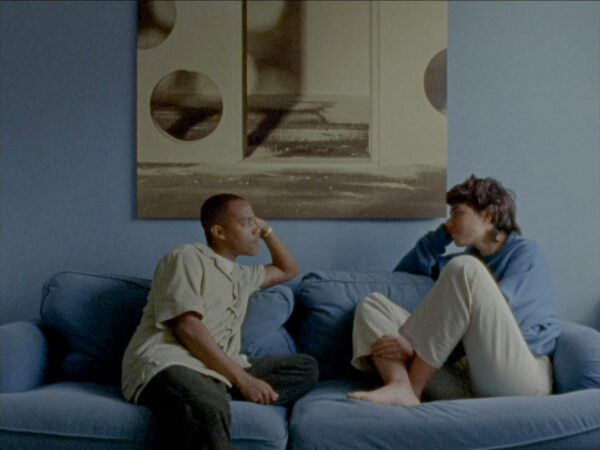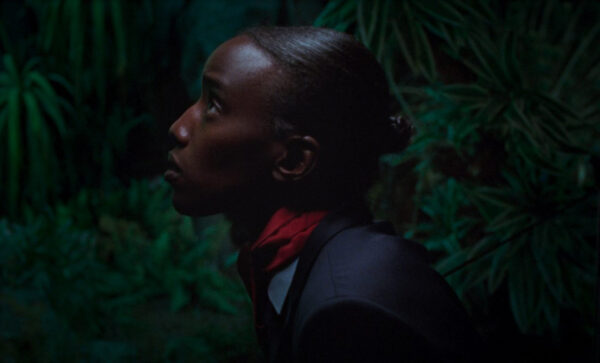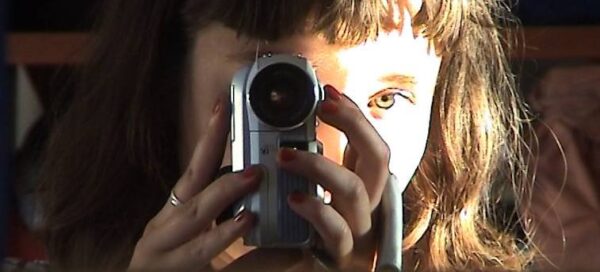Raging On
On Solid Ground
In On Solid Ground, Swiss director Jela Hasler touches upon accumulated inner anger until its critical moment of explosion.

In Joel Schumacher’s Hollywood-produced one-person action film Falling Down (1993), a man frenetically portrayed by Michael Douglas, psychologically hit by the traffic, the heat, the agoraphobic and alienating cityscape, and human stupidity, bursts out amidst the ruling chaos and starts to threaten everyone around with a gun. As a minimalistic small-scope elaboration on a similar theme with a lonely protagonist juxtaposed to the rest of the world at its center, Swiss director Jela Hasler’s short film On Solid Ground, currently part of the competition at the 50th edition of the Festival du Nouveau Cinéma in Montreal, touches upon the accumulated inner anger that one holds inside until a critical moment of explosion.
The trigger in both cases is aggression coming from a hostile setting. However, suppose the genre film narrative requires more obvious justifications of the protagonist’s motivation (such as the personal trauma revealed in the Schumacher film) to stick with the traditional dramaturgical logic. In that case, Hasler’s independent take on the subject explores the clashes between a human being and its surrounding environment in a more frivolous form—physical and aesthetical, spatial and temporal. An environment that in our modern times is as orderly as, in fact, inhuman.
It’s unclear why the original unambiguous German title Über Wasser meaning “above water” was translated to the English alternative On Solid Ground, while for the Cannes’ La Semaine de la Critique, where the film had its world premiere, it was translated in French as Hors de l’eau (meaning ‘out of water’). Nevertheless, all three variations serve the subject matter well and complement each other: ‘above’ and ‘out’ of water could be related to the dryness of the outer setting that ricochets into the main character’s sensibility, while ‘on solid ground’ might refer to her experiences of the world—firmly standing on her feet and confronting its mere brutality directly. At the same time, all three titles create a literal association with the opening scene in which the unnamed female protagonist (almost silently performed by Sofia Elena Borsani, who is gifted to express a lot with little), comes out of the canal in the city center of Zurich after a refreshing morning swim during a hot summer day.
This heroine is rather an antipode of the typical urban inhabitant who is physically overdependent on civilisational facilities and mentally glued to electronic devices. The woman in focus here is quite the opposite: she prefers natural waters over chlorinated, sterile swimming pools (for which, of course, someone will immediately scold her); she spends her afterwork time outdoors, despite her friend refusing to join her; she bikes everywhere around the city; and she pees in the bushes. All those choices portray a person who tries to enjoy the leftovers of nature amidst soulless urbanism. Most notably, throughout the twelve-minute-long runtime that summarises a random day in her life, she does not spend a second perceiving the world through a screen or isolating herself with headphones, as many of us do. Without ‘soma’ 11 In Aldous Huxley’s dystopian and prophetic novel Brave New World, soma is a happiness-producing hallucinogenic drug which satisfies virtually all users with pleasant experiences and is used as a society’s method of keeping its citizens peaceful. ↩︎ for the senses and censorship of the mind, she dares to engage and confront meaningless aggression, almost getting into trouble. When she finally reaches the supposedly peaceful home, the resentment has already escalated into her veins, causing her to vent her wrath onto her closest ones: she explodes fiercely but harmlessly, still within the limits of the permissible.
Depicted in a greyish palette and predominantly concrete texture, Zurich would have been unrecognisable to non-locals without a hint in the brief dialogue towards the film’s end. Hasler’s mise-en-scène unfolds a dynamic interaction between Borsani’s determined movements and looks and the anonymous metropolitan setting: as caught, she seems to be in the grasp of the city’s straight lines, ponderous infrastructure, and geometrical logic, as savage and spontaneous she grows. The noise-polluted soundscape interferes well with the city’s obscenity, yet gets on the main character’s nerves, as she does not accept the wholesale ugliness of modern life as a natural feature. Observing her ongoing desperate battle for some private, quiet space makes one want to scream; the loud rock song (No Borders by Pest Control) accompanying the final credits serves as that scream.
Looking back at Jela Hasler’s filmography, the observational non-dialogue approach is noticeable in at least three of her previous short films, not without the help of the patient and insisting camera of Andy Widmer, the cinematographer she regularly collaborates with. The Meadow (2015) innocently stares at cows grazing in a conflict zone between Lebanon, Syria, Jordan, and Israel. Le sens de la marche (2018) documents France’s stagnated state of emergency atmosphere after the 2017 presidential elections. A lockdown walk and contemplation of empty spaces is powerfully captured in Tomorrow’s Gone Today (2020), featuring the same magnetic Sofia Elena Borsani. Hasler’s first fiction narrative work, Über Wasser, confirms her (and Widmer’s) interest in the detailed exploration of places and spaces. Yet, this time, the environment is a fully developed character as it collides on a narrative level with a protagonist of flesh and blood.





There are no comments yet, be the first!